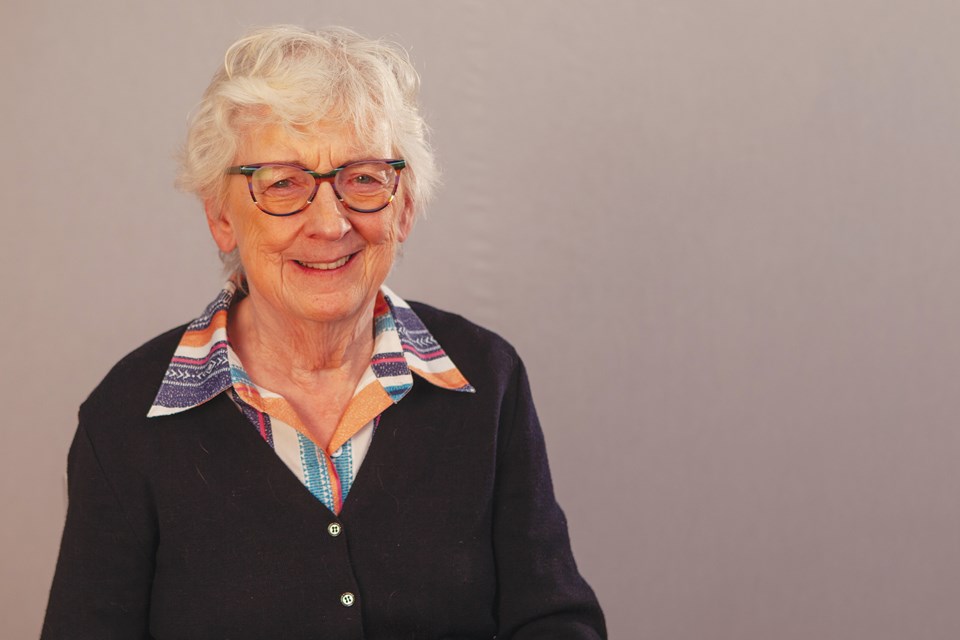The sequel to an award-winning memoir by Gibsons-based author Marion McKinnon Crook has topped the list of B.C. best-sellers since its publication last month.
Always on Call: Adventures in Nursing, Ranching, and Rural Living chronicles a year in the life of Crook’s five-member family on their Williams Lake ranch, set in the mid-1970s.
Crook was a public health nurse who treated patients across a geographic expanse equivalent to Puerto Rico. Together with her husband Carl, a rancher turned lawyer, the couple raised a daughter (produced “by the usual biological method,” she writes) and two adopted sons.
“I enjoyed my children,” said Crook in an interview with the Coast Reporter. “They were fun. They were interesting. We thought we’d adopt because it was unconscionable to have more children when there were babies looking for homes.”
Crook was raised in the Fraser Valley and moved to the Cariboo in 1963 to begin her nursing practice. Her early impressions of the region’s landscape and citizens were recorded in 2021’s Always Pack a Candle, which won the Lieutenant Governor’s Medal for Historical Writing. Last year, she received an award from the BC Arts Council to fund research on the sequel. Under the pen name Emma Dakin, Crook has also published a half-dozen “cozy mysteries” set in Britain.
The episodic chapters of Always on Call illuminate the variety of Crook’s preoccupations through 1975 and 1976: raising children, administering medical care, animal husbandry, community service, and long-distance travel. The couple owned a small aircraft. Crook earned a student certification so she could take off and land, although Carl usually piloted the plane.
“I think the seasons really matter when you live up in that country,” said Crook. “They determine how you act and what you do and who you meet, and where you go in terms of who you meet.”
Many of the challenges Crook faced in her Cariboo nursing practice almost a half-century ago remain contemporary issues. She helps a distressed member of the Anglican Church Women grapple with acceptance of a plumber who had undergone gender reassignment. She manages a case of suspected domestic abuse.
When she learns that a home care nurse’s son was struck by an automobile and killed, Crook takes a moment to check on her own children, asleep in their beds. “Of course, they were safe,” she recalls, before taking responsibility for patients of her grieving coworker.
The Gitxsan heritage of Crook’s son David occasionally casts racial prejudices into sharp relief. “I had thought David would be protected by our family and friends,” she writes.
“I never expected prejudice to be as strong as it is today [in 2024],” said Crook. “I thought that education and the changes in policy and better opportunities for education that Indigenous people finally got would make a huge difference. Well, they did make a huge difference, but not as much as I expected. I still hear prejudice.”
Crook’s exacting recall of spoken dialogue infuses her storytelling with immediacy and non-judgemental candour. When a cheerful young woman seeks medical assistance by introducing herself “I’m Ramona. I’m pretty sure I have the clap,” Crook requests the names of her recent contacts. After Ramona rattles off a dozen names, Crook suggests limiting the numbers: “Just those for the last, say, three weeks.” The young woman adds three more.
The book’s blend of personal and professional reminiscences renders a colourful, compassionate view of the far-flung Cariboo community.
“You meet people on the street who you work with, you meet people on the street who you socialize with,” said Crook. “It’s isolated in lots of ways, and with the isolation comes a sense of cohesion of the people who are there.”
Always on Call (published by Heritage House) is available from all booksellers on the Sunshine Coast as well as online retailers.




